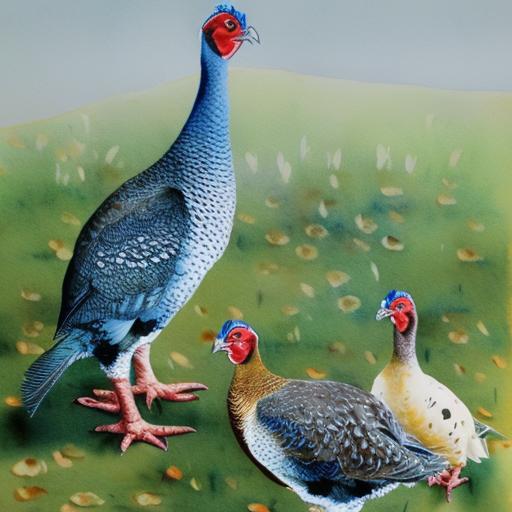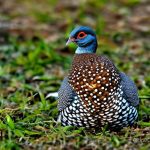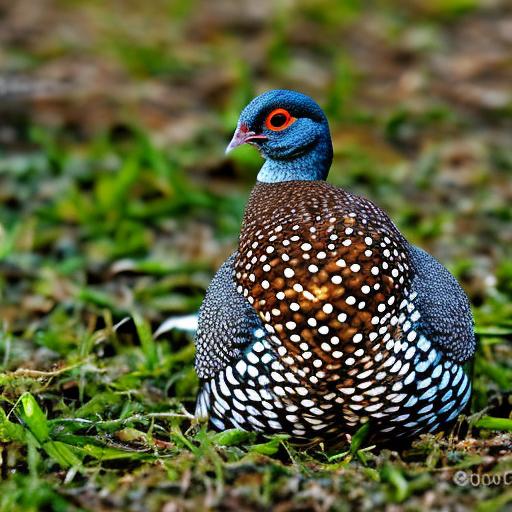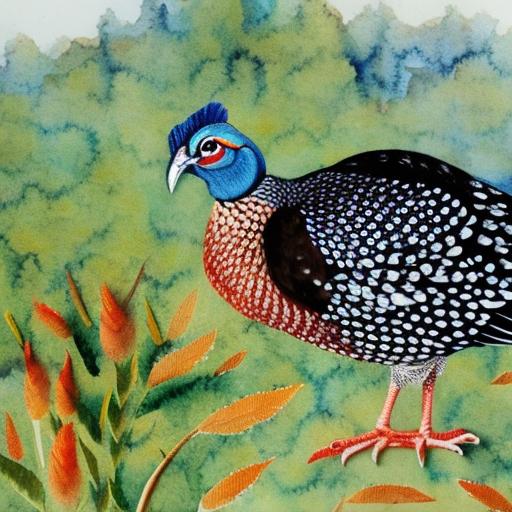Guinea fowl breeding has become increasingly popular in the UK due to the rising demand for their meat and eggs. These unique birds are known for their insect-eating abilities, making them a valuable addition to any farm or homestead. Breeding guinea fowl can be a rewarding and profitable venture for those who are willing to put in the time and effort to properly care for these birds. In the UK, guinea fowl are often raised for their flavorful meat, which is lean and rich in nutrients. Additionally, their eggs are prized for their rich, flavorful yolks, making them a sought-after product in the local market.
Breeding guinea fowl in the UK requires careful planning and attention to detail. From selecting the right breeding stock to providing proper housing and care, there are many factors to consider when embarking on this venture. Understanding the breeding season and incubation process, as well as how to care for guinea fowl chicks, is essential for success. Additionally, managing the health and disease of breeding guinea fowl is crucial to ensuring a thriving flock. Finally, marketing and selling guinea fowl offspring is an important aspect of the breeding process, as it allows breeders to recoup their investment and potentially turn a profit. In this article, we will explore each of these aspects in detail, providing valuable insights for those interested in breeding guinea fowl in the UK.
Key Takeaways
- Guinea fowl breeding is gaining popularity in the UK due to their low maintenance and high-quality meat and eggs.
- Select breeding stock with good genetics, strong immune systems, and good temperament for successful breeding.
- Provide spacious and secure housing with access to outdoor space and proper nutrition for breeding guinea fowl.
- Breeding season for guinea fowl is typically in the spring, and eggs require 26-28 days of incubation.
- Provide warmth, proper nutrition, and protection from predators for guinea fowl chicks to ensure their healthy growth.
- Regularly monitor the health of breeding guinea fowl and implement disease prevention measures to ensure a successful breeding operation.
- Market and sell guinea fowl offspring to local farmers’ markets, restaurants, and individuals interested in sustainable and organic poultry products.
Selecting the Right Breeding Stock
Selecting the right breeding stock is crucial for successful guinea fowl breeding. When choosing breeding birds, it is important to select healthy, vigorous individuals with good conformation and temperament. Look for birds that are active, alert, and free from any signs of illness or deformities. It is also important to consider the breed standard if you are breeding purebred guinea fowl, as this will ensure that your offspring meet the desired characteristics.
When selecting breeding stock, it is also important to consider genetic diversity. Inbreeding can lead to a host of health and reproductive issues, so it is important to introduce new bloodlines into your flock periodically. This can be done by purchasing birds from reputable breeders or attending poultry shows and auctions. Additionally, it is important to consider the age of the breeding stock. While younger birds may be more fertile, older birds may have proven themselves as good breeders. It is important to strike a balance between youth and experience when selecting breeding stock.
Housing and Care for Breeding Guinea Fowl
Proper housing and care are essential for breeding guinea fowl. Guinea fowl are hardy birds that are well-suited to free-range living, but they still require adequate shelter and protection from predators. When housing breeding guinea fowl, it is important to provide a secure coop or shelter that offers protection from the elements and predators. The coop should be well-ventilated and provide ample space for the birds to roost and nest.
In addition to providing a secure shelter, it is important to provide proper nutrition for breeding guinea fowl. A balanced diet that includes a high-quality poultry feed, as well as access to fresh water and grit, is essential for maintaining the health and fertility of breeding birds. It is also important to provide opportunities for the birds to forage for insects and other natural foods, as this will help to supplement their diet and keep them active and engaged.
Finally, it is important to provide proper care for breeding guinea fowl by monitoring their health and addressing any issues promptly. Regular health checks, parasite control, and access to veterinary care are all essential components of caring for breeding guinea fowl.
Breeding Season and Incubation
Understanding the breeding season and incubation process is essential for successful guinea fowl breeding. Guinea fowl are seasonal breeders, with the peak breeding season typically occurring in the spring and early summer. During this time, it is important to provide suitable nesting sites for the hens, as well as opportunities for mating and egg laying.
Once eggs have been laid, they can be collected for artificial incubation or left with the hens for natural incubation. If using artificial incubation, it is important to carefully monitor temperature and humidity levels to ensure optimal hatch rates. Natural incubation by the hens can also be successful, but it is important to provide a quiet, secure environment for the broody hens and their eggs.
During the incubation period, it is important to monitor the eggs regularly for signs of development and to address any issues that may arise. Proper turning of the eggs, maintaining optimal temperature and humidity levels, and providing appropriate ventilation are all essential components of successful incubation.
Caring for Guinea Fowl Chicks
Caring for guinea fowl chicks requires careful attention to their specific needs. Once hatched, guinea fowl chicks are active and independent, but they still require proper care and protection. It is important to provide a warm, draft-free brooder for the chicks, as well as access to fresh water and a high-quality chick starter feed.
In addition to providing proper nutrition and shelter, it is important to monitor the health of guinea fowl chicks closely. Addressing any issues promptly and providing access to veterinary care if needed will help to ensure the health and vitality of the chicks.
As guinea fowl chicks grow, they can be gradually introduced to outdoor living, allowing them to forage for insects and other natural foods. Providing a safe and secure outdoor environment will help the chicks develop into healthy, active adults.
Health and Disease Management in Breeding Guinea Fowl

Managing the health and disease of breeding guinea fowl is essential for maintaining a thriving flock. Preventative measures such as regular health checks, parasite control, and biosecurity protocols can help to minimize the risk of disease outbreaks. It is also important to provide a balanced diet and access to clean water to support the overall health of breeding guinea fowl.
In addition to preventative measures, it is important to be vigilant for signs of illness or disease in breeding guinea fowl. Common health issues in guinea fowl include respiratory infections, parasites, and nutritional deficiencies. It is important to address any health issues promptly and seek veterinary care if needed.
Finally, it is important to have a plan in place for managing disease outbreaks if they occur. This may include quarantine procedures, treatment protocols, and biosecurity measures to prevent further spread of disease within the flock.
Marketing and Selling Guinea Fowl Offspring
Marketing and selling guinea fowl offspring is an important aspect of breeding these birds in the UK. There is a growing demand for guinea fowl meat and eggs, making it a potentially profitable venture for breeders. When marketing guinea fowl offspring, it is important to highlight their unique qualities, such as their insect-eating abilities and flavorful meat.
There are several potential markets for guinea fowl offspring, including local farmers’ markets, restaurants, and specialty food stores. Building relationships with potential buyers and educating them about the benefits of guinea fowl products can help to create a strong market for your offspring.
In addition to selling live birds for meat production, there may also be opportunities to sell hatching eggs or day-old chicks to other breeders or homesteaders. Providing high-quality offspring and excellent customer service will help to build a strong reputation in the market.
In conclusion, breeding guinea fowl in the UK can be a rewarding and profitable venture for those who are willing to put in the time and effort to properly care for these unique birds. From selecting the right breeding stock to managing health and disease and marketing offspring, there are many factors to consider when embarking on this venture. With careful planning and attention to detail, breeders can create a thriving flock of guinea fowl that provides valuable meat and eggs for the local market.
If you’re interested in breeding guinea fowl in the UK, you may also want to explore the benefits of having a garden chicken coop. A well-designed coop can provide a safe and comfortable environment for your guinea fowl to thrive. Check out this informative article on poultrywizard.com to learn more about creating the perfect space for your feathered friends.
FAQs
What is the best time to breed guinea fowl in the UK?
Guinea fowl breeding in the UK is best done in the spring and summer months, typically from April to August. This is when the weather is warmer and there is an abundance of insects and other food sources for the guinea fowl to feed on.
How do I prepare for breeding guinea fowl in the UK?
To prepare for breeding guinea fowl in the UK, it is important to provide a suitable nesting area with plenty of straw or hay for the female guinea fowl to lay her eggs. Additionally, ensure that the guinea fowl have access to a balanced diet and clean water to support their breeding efforts.
What is the incubation period for guinea fowl eggs in the UK?
The incubation period for guinea fowl eggs in the UK is approximately 26-28 days. During this time, it is important to provide a stable and warm environment for the eggs to develop, either through natural incubation by the female guinea fowl or using an artificial incubator.
How do I care for guinea fowl chicks in the UK?
Guinea fowl chicks in the UK should be provided with a warm and secure brooding area, as well as a balanced diet of chick starter feed and access to clean water. It is important to protect the chicks from predators and provide them with a safe and comfortable environment to grow and develop.
What are the common challenges in breeding guinea fowl in the UK?
Common challenges in breeding guinea fowl in the UK include predation, disease, and inclement weather. It is important to take measures to protect the guinea fowl from predators, provide proper healthcare, and ensure that they have suitable shelter and protection from the elements.
Meet Walter, the feathered-friend fanatic of Florida! Nestled in the sunshine state, Walter struts through life with his feathered companions, clucking his way to happiness. With a coop that’s fancier than a five-star hotel, he’s the Don Juan of the chicken world. When he’s not teaching his hens to do the cha-cha, you’ll find him in a heated debate with his prized rooster, Sir Clucks-a-Lot. Walter’s poultry passion is no yolk; he’s the sunny-side-up guy you never knew you needed in your flock of friends!







